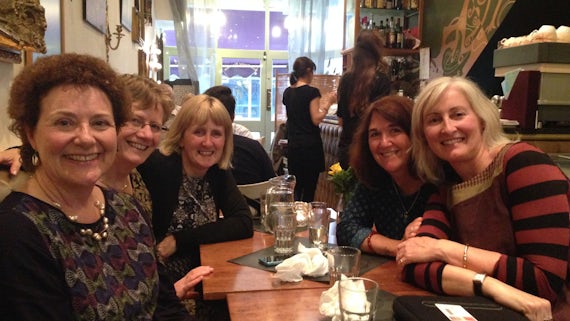The impact of workforce culture on midwifery care
24 Mai 2016

Investigating the relationship between midwifery workforce culture and the care of women and their families
Dr Christine Catling, a midwifery researcher from University of Technology Sydney, Australia recently visited Cardiff University’s School of Healthcare Sciences to discuss her research into workforce culture and its impact on woman-focused care.
Dr Catling’s research aims to explore the workforce culture of Australian midwives, to better understand some of the challenges that midwives face, what it is like to work in the midwifery environment and what issues they have regarding being able to practise woman-focused care.
Speaking about her research Dr Catling said: “The research is ongoing but preliminary findings have shown there is a diversity of cultures in the maternity workplace. Midwives working in smaller group practices, practising midwifery-led continuity of care report having collegial and managerial support, good interdisciplinary relationships and a high level of control and flexibility over their workload.
“Amongst other things, those working in larger, more urban hospital environments have reported that they feel unheard and unsupported by management, powerless to change things within the workplace, and are stretched to their limits with high workloads, poor staffing and stressed colleagues.
“The midwives reporting these issues have then relayed how their work environment does not enable them to practise ‘real’ midwifery – that they are pushed into being far more task-oriented instead of working in a woman-focused manner. The data showed a real frustration that they could not give high quality care to women and families due to the workplace restrictions; they loved their work, but not the workplace.”
Although there are no future workforce projections in Australia that look specifically at midwifery, there will be a huge shortfall of nurses in 2020, and this is likely to include midwives. Dr Catling’s study aims to bring to light the issues organisations can address to make environments more attractive to midwives. This will likely help with retention of staff, increase morale, cohesion and interdisciplinary collaboration. In turn, this will have positive effects on the care of women and their families.
The research of Dr Catling has strong links with the studies undertaken by Professor Billie Hunter from the School of Healthcare Sciences about the culture of UK midwifery, including a recent study of midwives' professional resilience undertaken with Dr Warren.
Professor Hunter said: “All of this research will help us to better understand the challenges experienced by midwives in high-income countries. But it's not just about stressful situations, these studies should also help us to learn more about what makes work rewarding for midwives.
“Supporting midwives in their work is absolutely crucial. Failure to do so could potentially impact on staff morale and retention. Midwifery is a challenging career and as such we already embed resilience as a theme throughout the new Cardiff Bachelor of Midwifery curriculum.”
Dr Catling will be returning to Australia with some wonderful memories, she said: “I have thoroughly enjoyed my time in Wales, getting to know the academics in the faculty and being shown around Cardiff and its surrounds. I even managed (only just!) to walk up Pen Y Fan.
“One highlight for me was being given an in-depth tour of the maternity unit at Heath Hospital. Being a large tertiary referral hospital, this busy unit manages to undertake important research projects, and provides opportunities for its midwives to extend their skills – such as learning ultrasound techniques, formal neonatal examinations and administering intravenous antibiotics to neonates. These are not mainstream skills Australian midwives have, although they are being slowly introduced there. It was great to see beautiful homely rooms with large baths in the midwifery-led unit, and a streamlining of pregnant women doing a ‘self-check-in’ in the antenatal clinic. I am looking forward to discussing these things with my Australian colleagues.”
Dr Catling hopes to get a paper published soon on the preliminary research into the midwifery workforce culture in Australia. For further information please contact: www.uts.edu.au/staff/christine.catling